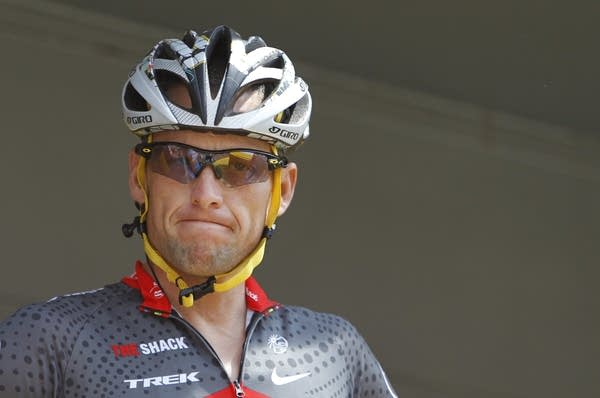'60 Minutes': Lance Armstrong ally testifies cyclist was doping
Go Deeper.
Create an account or log in to save stories.
Like this?
Thanks for liking this story! We have added it to a list of your favorite stories.

NEW YORK (AP) - A report by "60 Minutes" says George Hincapie, a longtime member of Lance Armstrong's inner circle, has told federal authorities he saw the seven-time Tour de France winner use performance-enhancing drugs.
A segment of the report aired Friday night on the "CBS Evening News," one day after it broadcast an interview with another former member of Armstrong's U.S. Postal Service team, Tyler Hamilton, who said he also used PEDs with Armstrong.
Hincapie has often been depicted as one of Armstrong's most loyal teammates and was with him for all seven Tour victories. In an interview last year, Armstrong said Hincapie was "like a brother to me."
Hincapie is among a number of former Armstrong teammates and employees who have appeared before a federal grand jury in Los Angeles investigating doping in cycling. Hamilton said he testified for six hours before the panel.
Turn Up Your Support
MPR News helps you turn down the noise and build shared understanding. Turn up your support for this public resource and keep trusted journalism accessible to all.
Armstrong has never tested positive and has steadfastly denied doping.
Using unidentified sources, "60 Minutes" reported that Hincapie testified that he and Armstrong supplied each other with the endurance-boosting substance EPO and discussed having used another banned substance, testosterone, to prepare for races. Citing the ongoing investigation, Hincapie declined to be interviewed by "60 Minutes," which will air its piece on the Armstrong investigation at 6 p.m. CDT Sunday.
Reached by the Associated Press at the Tour of California in Solvang, Hincapie said he didn't want to talk about the "60 Minutes" report.
"It's just unfortunate that that's all people want to talk about now," he said. "I'm not going to partake in any cycling-bashing. I have done everything to be the best I can be. ... I want the focus on the future of the sport, what it's done to clean itself up. I believe in cycling and want to support it."
Later, Hincapie released a statement through his attorney: "I can confirm to you that I never spoke with `60 Minutes.' I have no idea where they got their information. As I've said in the past, I continue to be disappointed that people are talking about the past in cycling instead of the future. As for the substance of anything in the `60 Minutes' story, I cannot comment on anything relating to the ongoing investigation."
Asked to comment on the newest "60 Minutes" report, Armstrong spokesman Mark Fabiani said: "We have no way of knowing what happened in the grand jury and so can't comment on these anonymously sourced reports."
The Hincapie and Hamilton revelations come a year after Floyd Landis, who had his 2006 Tour title stripped for using steroids, turned the focus of the feds' cycling investigation onto Armstrong, claiming he and Armstrong had both used drugs while on the U.S. Postal team.

But while Hamilton and Landis have credibility problems that Armstrong has pointed out -- both cyclists denied using drugs for years before changing their story and implicating Armstrong -- there aren't nearly as many issues with Hincapie.
The 37-year-old cyclist from New York has no known positive tests. He was on the Postal team even before Armstrong and, once Armstrong joined it, the two were frequent roommates on the road.
When Landis alleged that drug use was common on the U.S. Postal team -- and included Hincapie among those who doped -- Hincapie responded by saying, "It bothers me, because I've been doing this for 17 years and never heard anything bad about me."
After CBS aired the Hamilton interview Thursday night, the cyclist gave his 2004 Olympic gold medal back to the U.S. Anti-Doping Agency, which said it is working with the International and U.S. Olympic committees on an investigation.
"60 Minutes" also released an excerpt from another Armstrong teammate, Frankie Andreu, who said he took banned substances because lesser riders he believed were doping were passing him during races.
"Things were just getting faster and faster and sprinters were getting over the big mountains and winning, you know, climbing stages," Andreu said in the interview. "There's 200 guys flying over these mountains and you can't even stay in the group. And it's just impossible to keep up. And it's like, 'What the hell's going on here?'"
After the Hamilton and Andreu interviews went public, Armstrong launched a website refuting the claims and calling into question the credibility of Andreu, Hamilton and Landis. He also posted a letter addressed to CBS News, calling the "60 Minutes" reporting "disgraceful journalism."
Meantime, a pair of Armstrong's former European teammates told the AP they had no knowledge of doping within the ranks of the U.S. Postal team.
Pascal Derame, a Frenchman who was on the 1999 Tour-winning team with Armstrong, said he never saw Armstrong dope, but also conceded he wasn't in the cyclist's inner circle. Steffen Kjaergaard of Norway, who rode for U.S. Postal in 2000 and 2001, said he didn't feel any pressure to dope and "didn't have any hints -- 'You should do this. You should do that.' "
---
AP Sports Writer Greg Beacham in Sovlang, Calif., and Associated Press Writer Anthony McCartney in Los Angeles contributed to this report.
(Copyright 2011 by The Associated Press. All Rights Reserved.)




